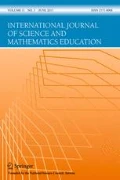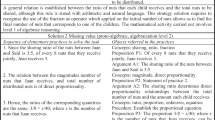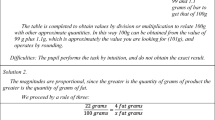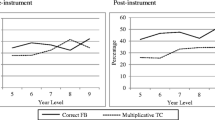Abstract
Solving problems by different methods, identifying the knowledge put at stake in each case, and stating variants of the problems are fundamental aspects of the competence of analysis of mathematical knowledge for teaching. This paper reports on the design, implementation, and results of a formative intervention with primary education prospective teachers to promote developing this competence using tasks that involve proportional and algebraic reasoning. The experience has been carried out with a sample of 88 students (two class-groups), applying a didactic model that includes work in teams, institutionalization, and assessment of the individual learning achieved. Seventy three percent of students were successful in solving problems; however, only 27% of students managed to solve the four problems proposed by at least two different procedures. More than half of the students adequately identified the knowledge involved in each problem and the algebraization level was correctly assigned in more than half of the proposed solutions. Elaborating meaningful variants to the problems was only achieved in a suitable way by less than 20% of the students. It is concluded that developing the epistemic analysis competence of tasks bringing into play proportional and algebraic reasoning requires a greater attention in the teachers’ formative programs.











Similar content being viewed by others
References
Aké, L., Godino, J. D., Gonzato, M. & Wilhelmi, M. R. (2014). Proto-algebraic levels of mathematical thinking. In A. M. Lindmeier & A. Heinze (Eds.). Proceedings of the 37th Conference of the International Group for the Psychology of Mathematics Education (vol. 2, pp. 1–8). Kiel, Germany: PME.
Artigue, M. (1989). Ingénierie didactique [Didactic engineering]. Recherches en Didactique des Mathématiques, 9(3), 281–308.
Ball, D. L. (2000). Bridging practices: Intertwining content and pedagogy in teaching and learning to teach. Journal of Teacher Education, 51, 241–247.
Ben-Chaim, D., Keret, Y., & Ilany, B. (2012). Ratio and proportion: Research and teaching in mathematics teachers’ education. Rotterdam: Sense Publisher.
Berk, D., Taber, S. B., Gorowara, C. C., & Petzl, C. (2009). Developing prospective elementary teachers’ flexibility in the domain of proportional reasoning. Mathematical Thinking and Learning, 11(3), 113–135.
Boston, M. D. (2013). Connecting changes in secondary mathematics teachers’ knowledge to their experiences in a professional development workshop. Journal of Mathematics Teacher Education, 16(1), 7–31.
Buforn, A., Llinares, S., & Fernández, C. (2018). Características del conocimiento de los estudiantes para maestro españoles en relación con la fracción, razón y proporción [Characteristics of student knowledge for Spanish teachers in relation to fraction, ratio and proportion]. Revista Mexicana de Investigación Educativa, 23, 229–251.
Burgos, M., Beltrán-Pellicer, P., Giacomone, B., & Godino, J. D. (2018). Prospective mathematics teachers’ knowledge and competence analyzing proportionality tasks. Educação e Pesquisa, 44, 1–22.
Chapman. O. (2014). Overall commentary: Understanding and changing mathematics teachers. In J.–J. Lo, K. R. Leatham & L. R. Van Zoest (Eds.), Research trends in mathematics teacher education (pp. 295–309). Dordrecht: Springer International Publishing.
Ellerton, N. F. (2013). Engaging pre-service middle-school teacher-education students in mathematical problem posing: Development of an active learning framework. Educational Studies in Mathematics, 83(1), 87–101.
English, L. D. (2008). Setting an agenda for international research in mathematics education. In L. D English (Ed.). Handbook of international research in mathematics education (2nd Edition, pp. 3–19). New York & London: Taylor and Francis (Routledge).
Font, V., Godino, J. D., & Gallardo, J. (2013). The emergence of objects from mathematical practices. Educational Studies in Mathematics, 82, 97–124.
Gaita, R., & Wilhelmi, M. R. (2019). Desarrollo del Razonamiento Algebraico Elemental mediante Tareas de Recuento con Patrones [Development of elementary algebraic reasoning by counting tasks with patterns]. Bolema, 33(63), 269–289.
Godino, J. D., Batanero, C., & Font, V. (2007). The onto-semiotic approach to research in mathematics education. ZDM. The International Journal on Mathematics Education, 39(1–2), 127–135.
Godino, J. D. Aké, L., Gonzato, M., & Wilhelmi, M. R. (2014a). Niveles de algebrización de la actividad matemática escolar. Implicaciones para la formación de maestros [Algebrization levels of school mathematical activity. Implications for teacher training]. Enseñanza de las Ciencias, 32(1), 199–219.
Godino, J. D., Rivas, H., Arteaga, P., Lasa, A., & Wilhelmi, M. R. (2014b). Ingeniería didáctica basada en el enfoque ontológico-semiótico del conocimiento y la instrucción matemáticos [Didactic engineering based on the ontological-semiotic approach to mathematical knowledge and instruction]. Recherches en Didactique des Mathématiques, 34(2/3), 167–200.
Godino, J D., Giacomone, B., Batanero, C., & Font, V. (2017). Enfoque ontosemiótico de los conocimientos y competencias del profesor de matemáticas [Ontosemiotic approach to the knowledge and skills of the mathematics teacher]. Bolema, 31(57), 90–113.
Guberman, R., & Leikin, R. (2013). Interesting and difficult mathematical problems: Changing teachers’ views by employing multiple-solution tasks. Journal of Mathematics Teacher Education, 16(1), 33–56.
Hill, H. C., Ball, D. L., & Schilling, S. G. (2008). Unpacking pedagogical content knowledge: Conceptualizing and measuring teachers’ topic-specific knowledge of students. Journal for Research in Mathematics Education, 39, 372–400.
Hilton, A., & Hilton, G. (2019). Primary school teachers implementing structured mathematics interventions to promote their mathematics knowledge for teaching proportional reasoning. Journal of Mathematics Teacher Education, 22, 545–574. https://doi.org/10.1007/s10857-018-9405-7.
Kaput, J. (2008). What is algebra? What is algebraic reasoning? In J. Kaput, D. W. Carraher, & M. L. Blanton (Eds.), Algebra in the early grades (pp. 5–17). New York: Routledge.
Kelly, A. E., Lesh, R. A., & Baek, J. Y. (Eds.). (2008). Handbook of design research in methods in education. Innovations in science, technology, engineering, and mathematics learning and teaching. New York, NY: Routledge.
Kieran, C. (2004). Algebraic thinking in the early grades: What is it. The Mathematics Educator, 18(1), 139–151.
Lamon, S. (2007). Rational number and proportional reasoning: Toward a theoretical framework for research. In F. K. Lester (Ed.), Second handbook of research on mathematics teaching and learning (pp. 629–667). Charlotte, NC: NCTM.
Lee, H. S., Coomes, J., & Yim, J. (2019). Teachers’ conceptions of prior knowledge and the potential of a task in teaching practice. Journal of Mathematics Teacher Education, 22(2), 129–151.
Lundberg, A. L., & Kilhamn, C. (2018). Transposition of knowledge: Encountering proportionality in an algebra task. International Journal of Science and Mathematics Education, 16, 559–579. https://doi.org/10.1007/s10763-016-9781-3.
Mallart, A., Font, V., & Diez, J. (2018). Case study on mathematics pre-service teachers’ difficulties in problem posing, EURASIA Journal of Mathematics, Science and Technology Education, 14(4), 1465–1481.
Milinkovié, J. (2015). Conceptualizing problem posing via transformation. In J. Cai, N. Ellerton, & F. M. Singer (Eds.), Mathematical problem posing: From research to effective practice (pp. 47–70). New York: Springer.
Pino-Fan, L., Assis, A., & Castro, W. F. (2015). Towards a methodology for the characterization of teachers’ didactic-mathematical knowledge. EURASIA Journal of Mathematics, Science & Technology Education, 11(6), 1429–1456.
Ponte, J. P., & Chapman, O. (2016). Prospective mathematics teachers’ learning and knowledge for teaching. In L. D. English & D. Kirshner (Eds.), Handbook of international research in mathematics education (3rd ed., pp. 275–296). New York, NY: Routledge.
Riley, K. J. (2010). Teachers’ understanding of proportional reasoning. In P. Brosnan, D. B. Erchick y L. Flevares (Eds.), Proceedings of the 32nd Annual Meeting of the North American Chapter of the International Group for the Psychology of Mathematics Education (vol. 6, pp. 1055–1061). Columbus, OH: The Ohio State University.
Rivas, M., Godino J. D., & Castro, W. F. (2012). Desarrollo del conocimiento para la enseñanza de la proporcionalidad en futuros profesores de primaria [Development of knowledge for the teaching of proportionality in future primary school teachers]. Bolema, 26(42B), 559–588.
Sadler, D. R. (2013). Making competent judgments of competence. In S. Blömeke, O. Zlatkin-Troitschanskaia, C. Kuhn, & J. Fege (Eds.), Modeling and measuring competencies in higher education: Tasks and challenges (pp. 13–27). Rotterdam, The Netherlands: Sense Publishing.
Scheiner, T., Montes, M. A., Godino, J. D., Carrillo, J., & Pino-Fan, L. (2019). What makes mathematics teacher knowledge specialized? Offering alternative views. International Journal of Science and Mathematics Education, 17, 153–172.
Shulman, L. S. (1986). Those who understand: Knowledge growth in teaching. Educational Researcher, 15(2), 4–14.
Sowder, J., Armstrong, B., Lamon, S., Simon, M., Sowder, L., & Thompson, A. (1998). Educating teachers to teach multiplicative structures in the middle grades. Journal of Mathematics Teacher Education, 1, 127–155.
Stahnke, R., Schueler, S., & Roesken-Winter, B. (2016). Teachers’ perception, interpretation, and decision-making: A systematic review of empirical mathematics education research. ZDM Mathematics Education, 48(1–2), 1–27.
Tichá, M., & Hošpesová, A. (2013). Developing teachers’ subject didactic competence through problem posing. Educational Studies in Mathematics, 83(1), 133–143.
Van Dooren, W., De Bock, D., Janssens, D., & Verschaffel, L. (2008). The linear imperative: An inventory and conceptual analysis of students’ overuse of linearity. Journal for Research in Mathematics Education, 39(3), 311–342.
Acknowledgments
Research carried out as part of the research project, PID2019-105601GB-I00 / AEI / 10.13039/501100011033 (Ministerio de Ciencia e Innovación) with support from the FQM-126 Research Group (Junta de Andalucía, Spain).
Author information
Authors and Affiliations
Corresponding author
Additional information
The manuscript is not previously published or simultaneously submitted elsewhere.
Appendix. Final assessment task
Appendix. Final assessment task
1. Solve the problems listed at the end (Annex, list of problems proposed), proper of primary education, by at least two different methods, considering those strategies that you think that your pupils would use to solve the problems.
2. Identify the knowledge put at stake in the solutions. For each solution, list the sequence of practices carried out to solve the problems and complete the table included below, adding the necessary rows.
Sequence of elementary practices to solve the problems | Objects referred to in the practices (concepts, propositions, procedures, arguments.) |
3. Assign, in a justified manner, levels of algebraic reasoning to the different solutions that you have given in the previous point to the tasks, taking into account the previously identified objects and algebraic processes.
4. Enunciate related problems whose solution implies changes in the algebraization levels brought into play. Solve the problems you have proposed, justifying the assignment of the levels.
Annex (list of problems proposed)
Problem 1.
If a 22 g cereal bar contains 4 g of fat, how much fat is there in 100 g of the product?
Problem 2.
In my school, of the 60 students in the 6th grade, 15 read a book every day. Of the 40 students in the 5th grade, 12 read a book every day. In what grade the ratio of readers is greater? Explain your answer.
Problem 3.
Five friends want to make a birthday gift. Each one must pay 5.40 euros. Four other friends join to contribute to the gift. How many euros should each one pay now? Explain how you got it.
Problem 4.
Ana, María, and Luis are planting trees in a “Replanting” camp. Ana and María started at the same time, but María is faster. Luis goes at the same speed as Ana, but he started earlier. When Ana had planted 4 trees, María had planted 12 trees and Luis had planted 8 trees. When finishing, Ana has planted 20 trees.
-
a)
How many trees will Maria have planted? Explain your answer.
-
b)
How many trees will Luis have planted? Explain your answer.
-
c)
After a time, if you know the number of trees that Ana has planted, how would you know the number of trees Maria has planted? And the number of trees Luis has planted? Explain your answer.
Rights and permissions
About this article
Cite this article
Burgos, M., Godino, J.D. Assessing the Epistemic Analysis Competence of Prospective Primary School Teachers on Proportionality Tasks. Int J of Sci and Math Educ 20, 367–389 (2022). https://doi.org/10.1007/s10763-020-10143-0
Received:
Accepted:
Published:
Issue Date:
DOI: https://doi.org/10.1007/s10763-020-10143-0




